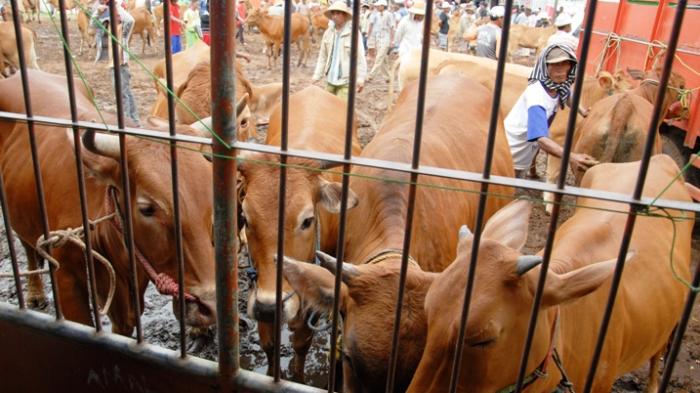Cement freezing is a technique for storing animal cells, plants, or genetic material (spermatozoa and ovum) in freezing conditions stored in liquid nitrogen at -194C. Frozen semen has been used extensively for injecting marriages. The purpose of cement freezing is that it can be stored in the long term but does not reduce the motility or viability of the spermatozoa.
The most important principle of freezing cement is the removal of water in cells (dehydration) before intracellular freezing. If dehydration does not occur, large ice crystals will form inside the cells and consequently will damage spermatozoa. When dehydration occurs, spermatozoa experience dryness; eventually death occurs.
In the process of cement freezing, there will be a cold shock (cold shock). The main effect of cold shock on spermatozoa is decreased motility, viability, changes in permeability, and changes in the lipid component of the membrane. Besides, lipid peroxidation and antifreeze factors (egg yolk coagulating enzyme, triglycerol lipase) found in sheep’s semen plasma are also factors that influence the clotting process.
Lipid peroxidation that occurs causes damage to spermatozoa. Spermatozoa susceptibility to lipid peroxidation is caused by spermatozoa plasma membrane phospholipids, which contain unsaturated fatty acids which are very susceptible to free radical attack.
Cow Seminal Plasma
Seminal plasma consists of various specific biochemical components that regulate the function of spermatozoa. The main composition of plasma cement is water and organic matter and inorganic material. Seminal plasma also contains a factor of decapitation (DF) which at the time of ejaculation coats the surface of spermatozoa. These decapitation factors will bind the surface of the spermatozoa activating intracellular calcium-ATPase to keep intracellular calcium concentrations low. It has been investigated that the addition of seminal plasma protein to cooled semen will affect the motility and viability of spermatozoa.
Sheep spermatozoa suffer severe damage during the freezing and post-thawing processes. That is because there is a coagulating enzyme factor in the seminal plasma called phospholipase A and triglycerol lipase. Besides, caused by low cholesterol levels in the plasma membrane and also distinguishes it from the seminal plasma composition of cattle.
In fact, skim milk thinners are isotonic media and contain components that can maintain the survival of spermatozoa under the influence of cold shock, but due to the presence of triglycerol lipase, the milk triglyceride hydrolysis process will occur, resulting in the release of unsaturated fatty acids, oleic acid from skim milk residues that will damage goat spermatozoa.
Cow seminal plasma in skim milk diluents in the freezing process can improve quality (motility, viability, intact plasma membrane) and decrease the post-thawing sheep’s spermatozoa core DNA fractionation so that the success of injecting mating is more satisfying.
This study used three treatments and six replications. Each treatment uses a skim milk diluent with the addition of different seminal plasma protein doses for storage at freezing temperatures. The diluent consists of 10 percent skim milk dissolved in 100 ml of water and added to 1000 IU penicillin and 1 mg / ml streptomycin. The diluent divided into diluent A and diluent B. The diluent A is added to sheep’s cement while diluent B is added to glycerol.
Control group (PO): sheep semen + diluent agent A. Treatment group I (PI): (sheep semen + diluent agent A) + cow seminal plasma protein (1: 1). Treatment group II (PII): (sheep semen + diluent A) + cow seminal plasma protein (1: 2). The three treatments were each mixed with diluent B in stages at 5oC and carried out equilibration for 1 hour then freezing to -196oC. The frozen semen stored in containers containing liquid nitrogen for one week. Thawing is done at 37 ° C for 30 minutes — evaluated motility, viability, intact plasma membrane and DNA fragmentation of spermatozoa.
The analysis showed that motility, viability, intact plasma membrane and fragmentation of the core DNA of sheep spermatozoa after thawing showed significant differences between the three treatment groups. Motility, viability, and intact plasma spermatozoa showed a high percentage, and DNA fragmentation of the spermatozoa nucleus was low in the group adding a dose of bovine seminal plasma protein of 1: 1 (PII).
The result of this study is cow seminal plasma protein in the freezing process of sheep semen using skim milk thinners can improve the quality of post-thawing sheep spermatozoa so that they can be used for injecting mating programs, especially in sheep. Thus the success of pregnancy in sheep will increase in percentage, the population of sheep increases so that the animal protein needs of the community are completed.
Author: Suherni Susilowati
Detail information from this research can be seen in our writing at:
http://www.ejobios.org/article/physiological-study-of-bull-seminal-plasma-in-skim-milk-diluter-to-improve-quality-of-6192





